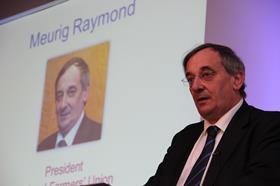
NFU president Meurig Raymond has called on the next government to back the farming industry and help stave off Britain’s growing food insecurity.
Opening the NFU conference in Birmingham this morning, Raymond said the fact another coalition government looks likely after the upcoming general election means the views of all parties matter.
Raymond cited a YouGov survey showing 85 per cent of British people want to see supermarkets sell more British food, but he warned that will be increasingly difficult without support. “The British consumer wants – indeed expects – to be able to source British food,” he said. “Yet if nothing is done, it will be far more difficult to achieve.”
Raymond laid out a number of areas where the next government can help improve food production. These included continuing to extend the remit of the Groceries Code Adjudicator; giving producers unhindered access to futures markets; longer periods for tax averaging, as is the case for Irish farmers; better country of origin labelling regulation; the removal of barriers to diversification; and more support for exports.
Poor regulation “threatens to ban hundreds of crop protection products through a misguided use of precautionary principles,” he added.
For their part, retailers must commit to longer-term contracts and relationships, Raymond insisted.
And farmers themselves need to better promote the values of British farming and food, as well as put more investment into processing.
In a wide-ranging speech, Raymond also touched on the political hot potato of whether Britain should stay in or leave the EU, stressing that all parties must offer more clarity on their policies so farmers can make up their minds.
“The EU is important to us as farmers,” he said. “It gives us access to the single European market, where 75 per cent of our exports go. It gives us access to labour, particularly from the new member states. And it gives us the CAP. And yes, there are pros and cons to all of these.
“But what we don’t know is what life would be like outside the EU, because none of the main political parties have given us any hint of what kind of agricultural policy they would pursue.”



